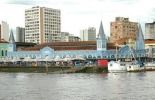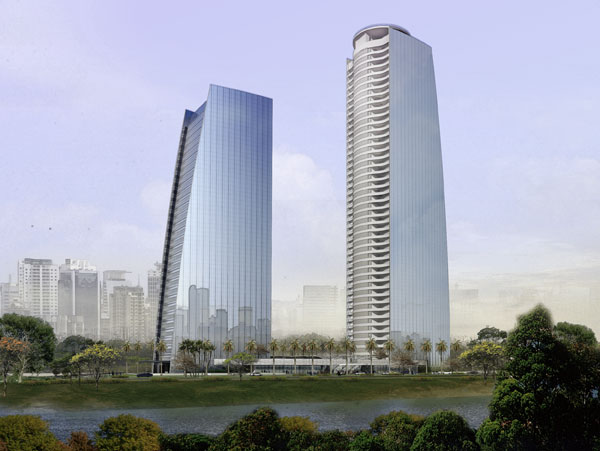 The first notice I received about Arne Naess death caused me sadness but, after minutes, a certain anger because I suddenly realized we had lost the opportunity to have this man and his relevant ideas with us in Brazil. I wondered why so many brilliant minds never came here, looking to Brazil as a distant country, immersed in Carnival and summer, to be known one day and nothing more… But, as Spinoza said, “Emotion, which is suffering, ceases to be suffering as soon as we form a clear and precise picture of it“. By the way, Spinoza and Gandhi had strong influence on Arne Naess thoughts. So, I decided to reflect a little deeper on the reasons I was anger.
The first notice I received about Arne Naess death caused me sadness but, after minutes, a certain anger because I suddenly realized we had lost the opportunity to have this man and his relevant ideas with us in Brazil. I wondered why so many brilliant minds never came here, looking to Brazil as a distant country, immersed in Carnival and summer, to be known one day and nothing more… But, as Spinoza said, “Emotion, which is suffering, ceases to be suffering as soon as we form a clear and precise picture of it“. By the way, Spinoza and Gandhi had strong influence on Arne Naess thoughts. So, I decided to reflect a little deeper on the reasons I was anger.
At the same month Mr. Naess died, Brazil is about to realize the World Social Forum 2009, created on an idea of a Brazilian man in 2001, and now a healthy Swiss foundation, which works as an UN consultant and is financed by more than 1,000 international companies. The event stimulates reflective thinking of “groups and movements of civil society that are opposed to neoliberals and to domination of the world by capital and any form of imperialism, and are committed to building a planetary society directed towards fruitful relationships among Humankind and between it and the Earth.” I am not sure but these last paragraphs seem to be full of irony. Shadow of my anger? Let me try reflecting a little more then because I do not like unfair things.
The movement was created aiming to oppose the World Economical Forum in Davos. It evolved to specific discussions. The first and second events were around four areas: production of wealth, sustainability, political power and ethics. The third event brought also themes like democracy, media, and militarization besides the first ones. The 4th event discussed information, environment and rights and equality, besides militarization and what they called transversal themes such as imperialist globalization, patriarchy, castes and racism, and religion like fundamentalism. The 5th event (India) was extensive, including all past themes and others like: art, communication, diversity, genres, human rights, autonomous thinking. The polycentric 6th event, held in Africa, Venezuela and Pakistan brought discussions on environmental issues at least in two of these places. The 7th FSM, in Kenya (2007) brought poverty and inclusion subjects among the usual ones. And so on…
The interesting characteristic of FSM, being a horizontal open space for exchange and discussions, is that it allows all this diversified approach, encompassing all mankind issues. The first themes remain and others are progressively aggregated in order to better evaluate what is happening in the world. That is why environmental question was growing up, until now, in the 2009 FSM event, that is held exact in the main forest area the capitalism is fighting for – Amazon forest. Nothing less than 12% of all planetary forests.
Arne Naess did not come to Brazil but certainly this 2009 Forum will have his ideas spread on the many discussions the event will conceive. Ten goals guide the 2009 event and the last one is “the defense of the environment (amazonic and others ecosystems) as source of life for the planet Earth and for the originary peoples of the world (indigenous, afro-descendent, tribal and riverine), that demand their territories, languages, cultures, identities, environmental justice, spiritually and right to live.”
I was anger because Brazil did not realize who Arne was. Probably Jose Lutzemberger, the Brazilian ecologist which ideas were so closed to Arne Naess, had already made the sufficient contact with him, concerning ethics. His participation in more than 40 international events must have impressed him with so many good ideas like Arne´s ones. He was decisive to put Brazil away of the atomic bomb plans. He died in 2002 and, surprisingly, it was his decision to be buried naked, wrapped in a sheet of linen, no coffin, that is, with no impacts to the environment in a manner consistent to with his life.
I must confess: these reflections made my sadness turn into a good feeling. I have the sensation that, by different ways and levels, all countries are getting together in the same consciousness about the meaning of this planet to our complex life and soul and vice-versa. In a way, naked Lutzemberg and Arne Naess are looking, from the high point of a paradise mountain, to the way we evolve here to the deep ecology.
World Social Forum 2009 – Belém, PARA – Brazil. www.fsm2009amazonia.org.br
Photo: Belém, in the State of Para, Brazil: Ver-o-Peso market, created in the Brazilian Colonial historical period. It is the largest free fair in Latin America. Belem is the territory for WSF 2009.





 The Brazilian Government will announce the GNP results for 2nd quarter next week. Our economy grew something around 1.8 and 2.0. Brazil has hired the P.R. consultant Fleischman Hillard (NY) – one of the most expensive in the world – to invite national and international journalists, analysts and other VIPs to discuss our perspectives with Brazilian Minister, Guido Mantega. The meeting will be on Monday.
The Brazilian Government will announce the GNP results for 2nd quarter next week. Our economy grew something around 1.8 and 2.0. Brazil has hired the P.R. consultant Fleischman Hillard (NY) – one of the most expensive in the world – to invite national and international journalists, analysts and other VIPs to discuss our perspectives with Brazilian Minister, Guido Mantega. The meeting will be on Monday. Globalization is eroding the efficiency of conventional taxes, such as value added taxes. At the same time, a new form of taxation, levied on bank transactions, was used in Brazil (1993-2007) and proved to be evasion-proof, more efficient and less costly than orthodox tax models.
Globalization is eroding the efficiency of conventional taxes, such as value added taxes. At the same time, a new form of taxation, levied on bank transactions, was used in Brazil (1993-2007) and proved to be evasion-proof, more efficient and less costly than orthodox tax models. Anatel, the agency that regulates communication in Brazil, just announced that the total number of cell phones in Brazil are 152.364.986 (Feb 2009) which amounts to almost 80% of the number of inhabitants in the country.
Anatel, the agency that regulates communication in Brazil, just announced that the total number of cell phones in Brazil are 152.364.986 (Feb 2009) which amounts to almost 80% of the number of inhabitants in the country.
 The first notice I received about Arne Naess death caused me sadness but, after minutes, a certain anger because I suddenly realized we had lost the opportunity to have this man and his relevant ideas with us in Brazil. I wondered why so many brilliant minds never came here, looking to Brazil as a distant country, immersed in Carnival and summer, to be known one day and nothing more… But, as Spinoza said, “Emotion, which is suffering, ceases to be suffering as soon as we form a clear and precise picture of it“. By the way, Spinoza and Gandhi had strong influence on Arne Naess thoughts. So, I decided to reflect a little deeper on the reasons I was anger.
The first notice I received about Arne Naess death caused me sadness but, after minutes, a certain anger because I suddenly realized we had lost the opportunity to have this man and his relevant ideas with us in Brazil. I wondered why so many brilliant minds never came here, looking to Brazil as a distant country, immersed in Carnival and summer, to be known one day and nothing more… But, as Spinoza said, “Emotion, which is suffering, ceases to be suffering as soon as we form a clear and precise picture of it“. By the way, Spinoza and Gandhi had strong influence on Arne Naess thoughts. So, I decided to reflect a little deeper on the reasons I was anger.
Don´t go short.
Posted by Nadiva Olivier on July 27, 2014
After World Cup season, we are starting the next season: President and State Governor´s elections in Brazil.
To be sure about your vote, try not to judge words or marketing campaign – look for their Government Plans, although at this time you will find just a few proposals and a lot of critics to the competitors.
1. Judge the candidates’ ideas. Write them down. This is essential to clear analyse the scenario they propose.
2. Don’t go short. To achieve greatness, you must think beyond how you’d naturally measure success. Think about where you want this country to be in 10 years from now and if the candidates are planning, at least, with such a vision.
3. Don’t ask for permission and try a due diligence at their numbers until now. If the candidate did not reach the figures proposed in his/her last election, why would he/she get the new figures now?
4. Look if they propose radical changes. Radical goal can move people exponentially instead of linearly. This is good for motivational purposes – or for convincing you to vote in a certain direction – but the reality of a government is something that demands debates, agreements and a lot of diversified movements.
There is no radical change… unless we are talking about a dictator´s government.
Posted in General Comments | Tagged: 2014 election in Brazil | Leave a Comment »